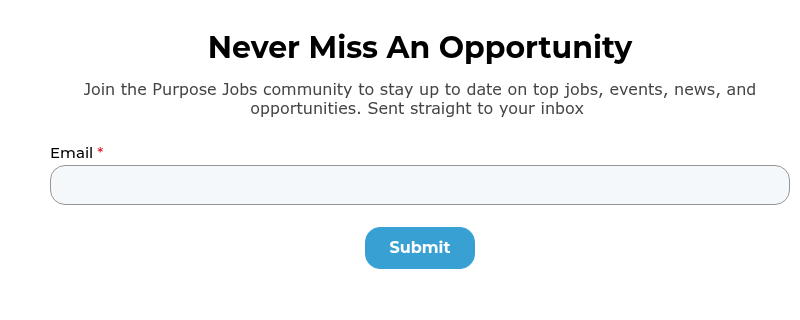A new global survey from Deloitte confirms the importance of what we do over here at Purpose Jobs — for many of today’s workforce, work isn’t just about a paycheck; it's also about purpose.
According to Deloitte’s 2025 Gen Z and Millennial Survey, 89% of Gen Z and 92% of millennials consider a sense of purpose critical to their job satisfaction and well-being. That’s huge. It means the reason people show up to work matters just as much — if not more — than what they do.
Even before joining Purpose Jobs, one of my key job satisfaction metrics was being excited for Mondays (I consider ‘Sunday scaries’ a red flag), and that directly correlates to the purpose and impact of my work. Employers understanding this correlation is critical to hiring and retention, and that’s part of what our storytelling helps accomplish.
The Link Between Purpose and Mental Well-Being
Purpose doesn't just influence job satisfaction, it is deeply connected to mental health. The same Deloitte survey found that:
- 67% of Gen Z and 72% of millennials with positive mental well-being feel their job allows them to make a meaningful societal contribution.
- Only 44% of Gen Z and 46% of millennials with poor mental well-being feel the same.
To sum that up, good mental health = feeling the positive impact. And bad mental health = being less connected to impact.
When I’ve experienced poor mental health in the past, it’s seeped into every nook and cranny of life and work. It’s equaled despair, low motivation, feeling like a failure, and TBH, too much crying. When these are the primary emotions being experienced, of course we’re not going to feel like we’re making a positive impact and fulfilling our purpose.
Employees who find purpose in their work are more engaged, loyal, and fulfilled, leading to higher productivity and retention. They’re going to uplift the rest of the team too, helping create a culture of positivity, joy, and determination.
Culture building is at the heart of employer branding, which is something that Purpose Jobs helps companies do every day. When companies clearly articulate their mission and values, they attract people who believe in them. That alignment creates deeper engagement from day one.

What Does Purpose at Work Mean?
You’ve probably already guessed this, but "purpose” looks different for everyone. Figuring out how you define it will be one of the key elements to finding fulfilling work.
- For some, it’s rooted in service, like working for a nonprofit (I did this via an AmeriCorps term right after college).
- For others, it’s about filling a gap, whether that’s creating an online marketplace for buying and selling used AV equipment or improving how the construction industry's workforce management processes.
- It could be solving problems or creating tools that make someone’s day-to-day just a little easier (hello favorite project management tool, Asana) — like helping solve the retirement crisis by empowering and enabling financial advisors or creating software solutions to transform hospital and infusion center operations.
- And sometimes, purpose means building a life that funds freedom — making money to fuel travel, passion projects, or just a darn good life.
However it shows up, purpose is personal — and always valid.
To help define your own purpose, you need to spend some time self-reflecting. Take a moment and consider, what causes, communities, or problems you care deeply about. What resources, tools, or systems are you obsessed with and want to tell everyone about? What do you want your work to make possible in your life or others' lives?
Then, use your job search and interviews to seek out and determine if a company aligns with your purpose. The interview process is as much your opportunity to interview the employer as it is their chance to get to know you. You can even use your interview time to request a demo of the products, ask about impact metrics, and dig into how your role will contribute to the mission.
Companies should always strive to help potential talent and their current team deeply understand their purpose and feel connected to it in their roles.
How Leaders Can Connect the Dots
So how do companies and leaders support job satisfaction for Gen Z and Millennials? Here are a few tips on cultivating purpose and well-being in the workplace:
 Align work with mission and impact: One of the most powerful things you can do as a leader is to help your employees find a connection in their daily work with the bigger mission. That means knowing and showing why their work matters. Sometimes that could be connecting an individual project and the bigger picture with a monthly conversation about the company’s mission, or giving a shout-out when someone’s work contributes to the larger goal. You can also go the extra mile and support the community outside of your core mission by creating volunteer opportunities or offering paid Volunteer Time Off.
Align work with mission and impact: One of the most powerful things you can do as a leader is to help your employees find a connection in their daily work with the bigger mission. That means knowing and showing why their work matters. Sometimes that could be connecting an individual project and the bigger picture with a monthly conversation about the company’s mission, or giving a shout-out when someone’s work contributes to the larger goal. You can also go the extra mile and support the community outside of your core mission by creating volunteer opportunities or offering paid Volunteer Time Off.
Support mental well-being through flexibility and empathy: If someone isn’t well at home, they won’t be well at work, and vice versa. Employers who provide flexibility demonstrate that they empathize with their employees’ needs and inherently trust them to complete their work. By offering flexible work arrangements, mental health resources, and a culture where employees feel safe discussing their needs, while also maintaining accountability, companies build a deeper connection with their employees.
Celebrate wins and foster loyalty: When employees go the extra mile, accomplish a big win, or uplift other team members, be sure to celebrate them! This celebration builds loyalty and reinforces purpose. Companies can achieve this through intentional recognition programs and storytelling to highlight their employee contributions.
The future of work isn’t just about skills and salaries, it's about finding meaning. Companies that prioritize purpose and well-being will attract and retain top talent, while job seekers who seek alignment will find greater fulfillment in their careers.
Because when people find work they love, everyone wins.









